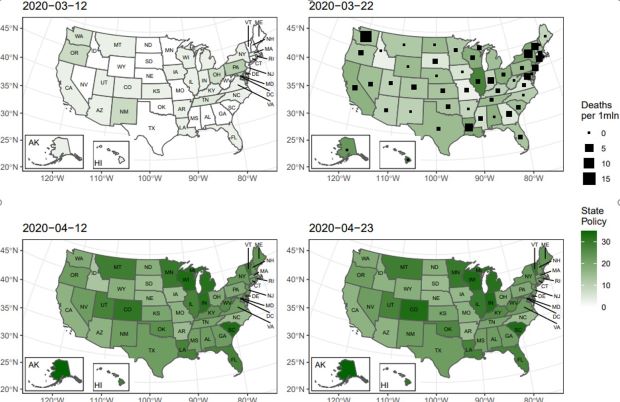The Big Question:
In COVID-19, humanity has confronted a threat unlike any in the lives of several generations. It was unexpected and sudden, and it affected everyone and impacted globally. Are our political institutions up for the task of managing this and any possible future similar threats? When societies need to quickly and decisively respond in order to protect us, which types of governments are best suited to provide the necessary response?
As the world is entering the era of increased frequency of global health and natural
disasters as the climate change looms, how we govern ourselves matters for the ways
in which we will live through these difficult times. Our observations fromthe politicians'
management of the COVID infection are manifold. First, the impact of constitutions,
political regimes, and political institutions on crisis responsiveness is identifiable,
both in small n and large N analysis, despite the many idiosyncrasies of individual
country-cases. Second, institutional history matters – provisions, either put in place
recently, after a previous crisis, or long in the past and almost forgotten through
non-use, come into play and either impede or empower decision makers, depending on
how congruent they are with the de-facto decision structure. Third, the economy imposes
constraints on managing the crisis. The per capita income, the structure of the economy,
the condition of the labor force, and the accumulated social capital, all are the
prerequisites of mounting a more effective crisis response. Fourth, political concerns
of the day can make a huge difference: crisis response might be delayed because of
the immediate political expediency, or it might be hijacked and repurposed to solidify
the position of the political incumbent. Entering a crisis with a country’s political
“house” not “in order” is dangerous. Fifth, who does what in government – or the allocation
of responsibilities – has shown itself as a living, breathing process. It often underwent
rapid adjustments during the period of crisis. And finally, the sixth and perhaps
the most important takeaway is that all these influences affect the way governments
respond to the crises via one main mechanism -- through shaping the incentives of
the key decision-makers to act and to take the risks associated with leadership during
the periods of hardship. The resolve of politicians to protect public health cannot
be taken for granted, and their strategies should be scrutinized at least as much
through the political lens as from the standpoint of public health benefits 
As we are taking stock of all the aspects of the COVID-19 pandemic history, one important lesson to be learned is about the governments’ behavior. While the defense by immunity was in the works in the research labs, the defense by government action took the front seat and political incumbents in every country and locale became doctors to the public. Did some governments perform better than others? Were there any predictable or explainable shortcomings in their crisis responses? Will governments and countries that underperformed fall short in other crises where responsible leadership might be required? Despite the synchronicity of the threat and all governments’ initially similar helplessness in the face of the COVID virus, how they acted differed greatly around the world. The speed of their responses varied also, even if we account for the timing of the initial virus detection in their countries. Importantly, the stringency of their enacted non medical interventions (NMIs) varied a lot as well. Arguably, these differences drove at least in part the health outcomes in their countries.
We approach these questions through mathematical models and data analysis. Our team has built the global data set of COVID policy-making. Groups of researchers within the lab share special focus on areas of the globe, pursuing lines of inquiry in the United States, European Union, Africa, Asia, South America, and the British Commonwealth.
Global Data Set
Who We Are:
Members and affiliates of our Lab are faculty, post-doctoral researchers, and doctoral students in social sciences, health sciences, and computer science from multiple academic institutions worldwide. Our base of operations is in Binghamton University, which is a Research Center of the State University of New York in the US -- the State that was hit the hardest by the COVID-19 outbreak.
Links on COVID-19 and policies:
Coronavirus global map by Johns Hopkins
Economic Policy response, by International Monetary Fund
COVID-19: Policies to Protect People and Communities, by URBAN WIRE
Official US Government Response to Coronavirus, COVID-19, by usa.gov
Contact information:
Olga Shvetsova, shvetso@binghamton.edu